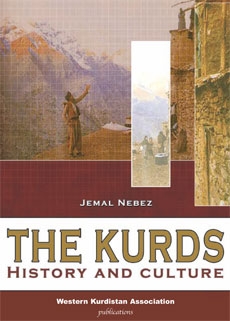| PREFACE
On the occasion of the inauguration of the Kurdish community-house in Berlin, Germany in September 1997, the well-known Kurdologist Dr. Jemal Nebez held a warmly received speech under the title: The Kurds – their history and culture.
This speech was not only of great importance because of its contents and coverage, but also because it was based on precise data and historic scientific evidence. In his speech Dr. Nebez covered various subjects, e.g. pre- Christian ancient history and the mythology of the Kurds, the cultural height and depth of the Kurdish people in the shadow of the numerous expeditions by alien peoples through Kurdistan, the astounding variety of religions in Kurdistan, with special stress on syncretism as the most striking feature of the Kurdish religious culture, delineating syncretism as inherently different from mixed religions.
As an analytically thinking scientist (physicist) the speaker did not get stuck in the past, nor was his speech an archaeological presentation, but an Archigenesis, which in fluent transition reaches from past epochs to the present situation of the Kurdish people.
The above-mentioned aspects are described in chronological sequence with scientific underpinnings. One can say with a fair amount of certainty that this presentation will be of use to all inquiring and truth searching minds, whatever nationality or politicalreligious Weltanschauung they may hold.
Apart from the fact that the speaker has been active in the field of Kurdology for nearly half a century, and has published a great number of scientific works in several languages on varying subjects and fields, he is one of the few Kurds in Germany (the traditional homeland of Kurdology), who revived here the interest in Kurdology after it had been practically non-existent following the second world war. It was largely due to him that a department of „Kurdology“ was established in the Institut für Iranische Philologie at the FU-Free University/Berlin where he worked as a researcher and academic teacher for 12 years.
Through decades of tiresome investigations and careful analyses of documents faked by the oppressors of the Kurdish people, Dr. Nebez was able to bring many concealed facts back to light and made an important contribution documenting the cultural history of the Kurdish people. Already in the 1950‘s Dr. Nebez was in the public eye because of his often misunderstood yet courageous presentation of the Kurds as a nation and their national question. He has since then not only asked for uncompromising Kurdish thinkers to come to the fore but has himself been one. He has presented a concept of Kurdishness, i.e. of the Kurdish Nation, where everything else that has been or is said about it has become somewhat banal. The heart of this philosophy, a type of Kurdish Magna Charta, is a national way of thinking and the founding of Kurdishness in healthy symbiosis with the neighbouring peoples. What Dante said about Zoroaster „his word is made of stone, his work is a building“ could also be said about Nebez. In his speech Dr. Nebez offered a precise etymological and ethnographic analysis of a variety of witnesses of Kurdish history: „Words, terms, objects and any appearances of former social life“, which for centuries have been assigned as „non-Kurdish“ by those who have occupied Kurdistan, and have been thoughtlessly taken on by unsuspecting and uncritical Kurds. This reveals that Dr. Nebez is not a conventional historian, but has himself made history, being someone who embodies cultural criticism and social philosophical principles.
Besides the conviction of the right of the Kurdish people to a united homeland, without needing the permission of other powers but as an inherent right, there are mainly two principles, which basically characterize Nebez: Eternal search for historical proofs and uncompromising articulation of the facts, as expressed clearly in this speech.
Priv. Doz. Dr. Med. Hasan Mohamed Ali,
Director of the Board of the Kurdish Community House in Berlin, Germany | 